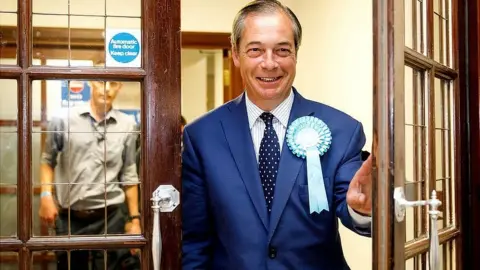What would a Brexit Party Brexit look like?
 Getty Images
Getty ImagesThe Brexit Party has won the largest share of the vote and the most seats in the UK's European elections.
Many of its policies are unknown, it produced no manifesto, and it has avoided answering detailed questions on immigration or economic policy.
One thing we do know very clearly is that it wants to leave the European Union as soon as possible.
So what would a Brexit Party Brexit actually look like?
'Clean break'
The Brexit Party leader Nigel Farage says he wants a "clean-break" Brexit, abandoning the withdrawal agreement that Theresa May's government negotiated with the EU.
It is notable that Mr Farage tended to avoid the term "no-deal" Brexit during the election campaign.
A party spokesman argued that it is a misleading term that gives a false impression.
Without a withdrawal agreement, though, most of the vast network of rules and regulations that have governed the UK's relationship with the rest of Europe for more than 40 years, whether in trade or security or other issues, would disappear overnight.
That's what a clean break would mean.
While arguing for a swift exit, the Brexit Party has also called for its newly elected MEPs to play a "major role" in the Brexit negotiations.
But as the Brexit Party is not in government and has no MPs in the House of Commons that is highly unlikely. The only direct role Brexit Party MEPs might have is if the withdrawal agreement was ever to pass in the House of Commons - there would then be a vote in the European Parliament to ratify it.
A clean break also means - and this was a promise that appeared on a pledge card the Brexit Party produced during the campaign - that it would refuse to pay the £39bn financial settlement, or "divorce bill", that the government has agreed in order to settle past debts and future obligations to the EU.
WTO terms
And it means the party wants to leave the EU on - as it puts it - World Trade Organization (WTO) terms.
It sounds very simple, and it is a phrase that is also used by several contenders for the Conservative Party leadership.
But what does it mean in practice? Not a lot.
The basic rules of the WTO are really just the baseline of international trade, which don't offer more than the most rudimentary of benefits.
A lot of Brexit supporters - including the Brexit Party - argue that the UK can use something called Article 24 (of GATT - the General Agreement on Tariffs and Trade) to ensure that the UK can still enjoy free or frictionless trade with the EU.
It would mean no tariffs or taxes would be imposed on goods crossing borders between the UK and its largest trading partner, the European Union.
The trouble with that argument is that you can only use Article 24 if two parties are willing to make an agreement - in this case, the UK and the EU. Neither can impose it on the other.
In other words, you have to agree a deal first and the Brexit Party, along with several would-be Conservative leaders, are prepared to leave without a deal.
EU negotiations
Mr Farage argues that there will in fact be a deal of some kind because the EU needs one.
He has been fond of saying that when push comes to shove the EU would "come running" to do a quick trade deal with the UK.
That's quite a gamble.
It is certainly true that any significant disruption to trade would hurt both sides, but the EU has said consistently that it values the integrity of its single market more than free trade with the UK, and that that will be its priority.
Of course no deal or a "clean break" is not an end in itself. Eventually - and sooner rather than later - the two sides would have to start talking again about a future agreement.
The 27 other EU countries have already agreed that if there is no deal then the first thing they would want to talk to the UK about after Brexit would not be a trade deal.
It would be the financial settlement, citizens' rights and the Irish border - exactly those issues that are dealt with in detail in the withdrawal agreement that has been rejected three times in the House of Commons.
The Brexit Party is offering simple solutions. But the Brexit process is full of complex problems.



